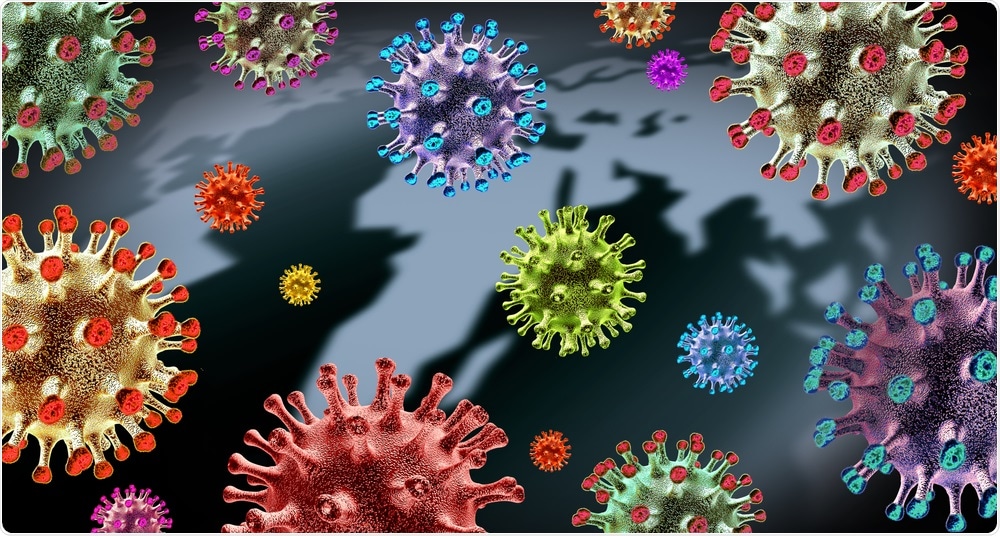Swedish researchers have developed COVseq, a SARS-CoV-2 genome tracker that can be produced at a large scale for a small cost.

SARS-CoV-2 Variants. Image Credit: Lightspring/Shutterstock.com
A race against time to address SARS-CoV-2 evolution
Thousands of viral genomes have been identified and sequenced to reconstruct the evolution and global spread of the coronavirus. This information is key to identify the variants that are more contagious, pathogenic, or resistant to existing vaccines and treatments.
The potential fallout of SARS-CoV-2 could force countries to re-enter lockdown and render current vaccination efforts ineffective. However, researchers are already attempting to address these issues by developing several approaches.
First, vaccines have been increasingly proven to be effective against most current variants, which could limit the spread of current and emerging variants. Second, policies have been implemented to identify and trace the source and spread of variants to contain the spread. Finally, researchers have also begun to develop genomic tools to facilitate the tracking of variants.
The former was the focus of a study published in the journal Nature Communications by scientists at the Bienko-Crosetto laboratory at Karolinska Institute and Science for Life Laboratory (SciLifeLabthe in Sweden. The team succeeded in developing technology for cost-effective surveillance of the global spread of new SARS-CoV-2 variants.
The new method, named COVseq, can surveil the viral genome on a massive scale at a low cost through sampled multiplex PCR copies that are pooled together and uploaded into the same online sequencing library.
"By performing reactions in very small volumes and pooling together hundreds of samples into the same sequencing library, we can sequence potentially thousands of viral genomes per week at a cost of less than15 dollars per sample," describes Ning Zhang, a postdoctoral researcher at the Department of Medical Biochemistry and Biophysics, Karolinska Institute and co-first author of the present study.
Inexpensive, accurate, and ready for widescale implementation
Analysis comparing 29 SARS-CoV-2 positive samples revealed that COVseq had an equal ability as standard methods to identify small genome changes, but further examination of 245 other samples showed COVseq had a particularly high ability to detect emergent viral variants of concern.
This demonstrates the effectiveness of COVseq, which is further beneficial thanks to the cost-effectiveness relative to other current methods of detection. Indeed, multiplex PCRs are inexpensive and do not require specialist training, making them widely accessible to frontline workers around the world.
Our inexpensive method could immediately be used for SARS-CoV-2 genomic surveillance by public health agencies and could also be easily adapted to other RNA viruses, such as influenza and dengue viruses,"
Nicola Crosetto, Department of Medical Biochemistry and Biophysics, Karolinska Institute
Such an effective and promising genomic tracker may prove particularly valuable as the rates of vaccination increases around the world. Several countries including India and the United Kingdom are already experiencing the effects of harmful variants.
Yet this pattern is nothing new, as it has been proven that several variants were already present at the onset of the pandemic in China. Researchers are therefore well aware of the ability of SARS-CoV-2 to mutate, and tools that are inexpensive and widely available will be the most effective in identifying, tracking, and treating emerging variants.
Journal reference:
- "COVseq is a cost-effective workflow for mass-scale SARS-CoV-2 genomic surveillance". Michele Simonetti, Ning Zhang, Luuk Harbers, Maria Grazia Milia, Silvia Brossa, Thi Thu Huong Nguyen, Francesco Cerutti, Enrico Berrino, Anna Sapino, Magda Bienko, Antonino Sottile, Valeria Ghisetti and Nicola Crosetto. Nature Communications, online 23 June 2021, doi: 10.1038/s41467-021-24078-9.